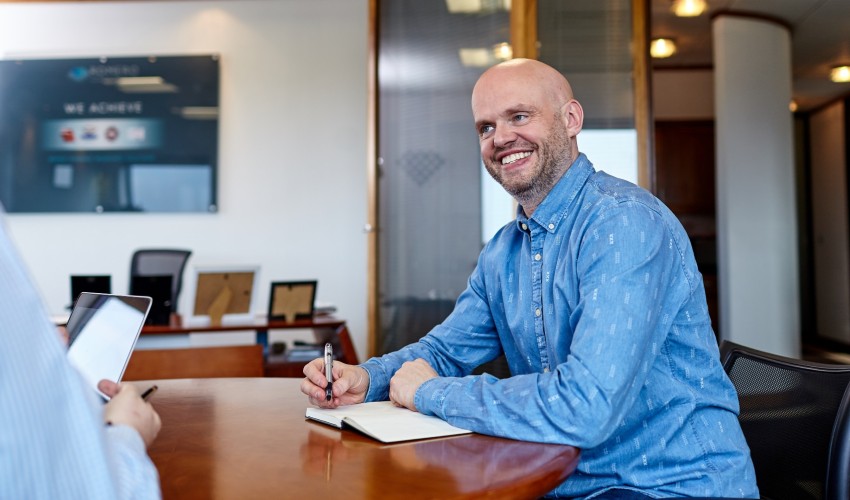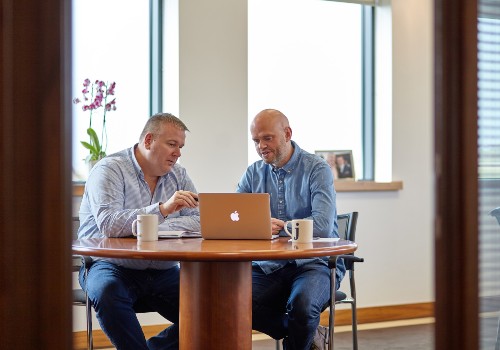Michael Craggs on Conflict in the Workplace
Conflict and people management is an issue affecting businesses which has only grown. With movements such as #MeToo, social media campaigns and working from home arrangements, conflict has become perhaps a symptom of the louder society within which we live.
People Management magazine released an article on how conflict is ruining workplaces. The excellent article expresses the views of many parties concerning how to deal with conflict.
I took the time to go through these controversial opinions with our HR and Business Support Manager Michael Craggs. I asked him 7 questions based on different points posited in the article:
1. Natasha Wallace – “I think people are getting more confident at speaking up, as though they finally have a voice.”
I asked Michael: Are employees becoming more open and honest?
Michael – We have an environment at Romero where we want our staff to be open and honest. We believe they should be honest with their managers and with Simon and Justin. Only through getting people’s real opinions can we know what needs to change.
We regularly ask for staff feedback through GetFeedback forms, and in the past have run pulse surveys. We discuss HR topics in management meetings, but there is still more we could do. In the future Vicky and I plan to run more staff forums and we will be looking to kickstart pulse surveys which will be one or two questions per week. This will help us further temperature check how our people are thinking and feeling. Staff engagement is key to a successful high performing business.
So, has it improved in recent years, yes, but we want more honesty. When we issue out a survey in an ideal world we would get a 100% response rate, everyone has a voice and we want to hear it. Do I think social media and outside influences have affected this, no not massively.
2. Natasha Wallace continues – “As soon as you have a more honest environment where people historically felt they had to keep things to themselves, you need to have more robust conversations and give honest feedback.”
I asked Michael: Are managers now also more honest?
Michael – Definitely. I 100% agree with this, and I believe there should be 100% transparency. The more honesty the better, and that’s from both directions.
We want our managers to have good personal and professional relationships with their staff. Management should have regular 1-2-1s with employees and they use this time to offer constructive feedback. Sometimes the honesty and the feedback given might not be what a person wants to hear. However, there’s always a reason why they are offering this feedback and if feedback is delivered in the right manner these reasons should be understood.
3. Jo Farager explains that offices which experience a “tinderbox environment” are linked to “incongruence – where leaders say one thing and then do another.”
She then adds – “Companies often say ‘We support wellbeing’ and then expect staff to work long hours, or for teams of people to work individually.”
I posed this difficult question to Michael and he explained how important it is for companies to deliver on promises:
Michael – Companies need to deliver on what they are saying. I agree that companies who do talk the talk but don’t walk the walk can understandably rub their staff up the wrong way.
At Romero we try hard to support our employees, and we do promote wellbeing. We have regular wellbeing seminars, social activities, wellbeing champions, newsletters and healthcare plans.
We also expect hard-working. We expect people to work to the best of their ability. In our line of work it can be very seasonal, some parts of the year are busier than others. And we expect our colleagues to finish what they are working on and not be clock watching, wanting to shoot out the door one-minute-to-five (unless of course they really need to).
We believe these two qualities come hand in hand, they do not contrast. We don’t expect our people to be burning out. It’s important to be happy in work. and if you are happy in the office we believe you are more likely to work harder and stay an extra 15 minutes if that’s what’s needed.
This demands support from management, wellbeing, and regular check-ins to create that environment. Some may say you should split your work life from your personal life, however I firmly believe they will inevitably crossover. Creating a culture that allows for that is the responsibility of us all, no matter what role you hold within the business. Everyone has a part to play. We need to work together and pull in the same direction. I guess this all points back to embracing our company core values.
4. Jo Farager – “What is happening outside are all factors that lead to friction at work.”
I asked Michael: Do we request staff leave their personal views at the door?
Michael – Look, everyone has their own views about the world, politics, society, Brexit, COVID, everything. We don’t exactly want people to leave them at the door, but we don’t want people having political debates in the office. This creates divisive teams or clusters and can create, yes, friction. But around the water cooler or in the kitchen is fine, its good.
As long as people are not fundamentally falling out, I don’t think it’s a big issue. Different views is actually a huge advantage for companies, diversity is important and necessary, and thinking differently is what leads to innovation.
5. Psychologist Kisane Prutton talks of “’asymmetrical unhappiness’ – instances of accumulating conflict that may not end up in a formal grievance, but chip away at a company’s culture.”
With this in mind, I asked Michael: How can businesses ensure the culture does not become negative or toxic?
Michael – I’ve worked in an insurance environment previously where the culture was toxic. Its was very ‘us vs them’. The staff didn’t want to be there. I felt there was no honesty, no two-way conversation, no forums and long rooted issues between work colleagues and management.
From seeing that, I feel I can see the warning signs. But it’s up to mangers to ‘temperature check’ their teams. If managers ignore it or ignore people, then people become unhappy. They start to moan and complain and that creates pockets and divisions.
Human nature is to belong. We want staff to feel they belong to a team, to the company. Some people can become terrorists within an organisation, disassociating themselves and wanting to bring the company down – It’s managements’ failing if that were to happen.
6. Anna Shields believes – “Managers are scared so they get HR involved too quickly. Or their lack of confidence means undercurrents are allowed to fester and aren’t nipped in the bud.”
Andy Cook says “Manager don’t like to admit they’re not good at it (dealing with conflict) and so they go into avoidance mode.”
I asked Michael: How does this compare with your experience at Romero?
Michael – I disagree with this point. At Romero, I firmly believe our managers have a good relationship with both their staff and with HR. It is not HR’s job to take over the situation, but instead to assist.
At Romero, HR exists as a sounding board; we offer advice and guidance, but the matter is very much dealt internally within the teams. I feel this is the best way for relationships to be repaired if there does happen to be conflict.
7. The CIPD argue – “More value needs to be attached to employment relations as a HR discipline.”
I asked Michael whether employment relations have become a larger part of HR’s role.
Michael – To work in HR is to work to improve company culture. HR teams need to be able to understand and feel out the culture, find what’s going wrong and then work to change it for the better.
Because I moved to HR from managing the Existing Business Team, I already knew many people in the Romero business, so I had already made those important connections. With NDML and Club Insure and the wider Romero Group, I’ve tried to build up those new relationships. I believe before exacting change, HR needs to get to know the culture. Every company is individual and unique.
Being familiar with Romero, we have put in place policies and procedures, such as buy/sell holiday, the volunteering scheme, giving one day to a local charity, we’ve offered everyone full access to the Romero Academy for personal and professional development, created a sports and social club. These are in tandem with events such as summer barbeques, parties and outings for the teams.
These changes and acts can be considered techniques to improve employment relations, however I wouldn’t say more value needs to be attached. At Romero, we very much understand and respect the value of good employment relations and a good company culture.
WILL WORKING FROM HOME BECOME THE NEW NORMAL?
I went through these five predictions with our HR and Business Support Manager Michael Craggs. He articulated his experiences working in HR for an independent broker through the pandemic, his view of the general consensus and where he stands in relation to the BBC’s predictions.




